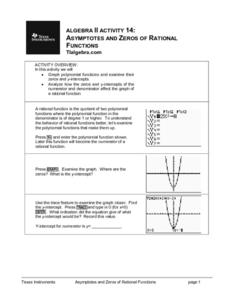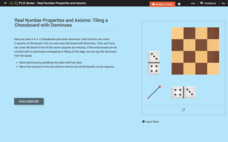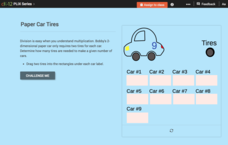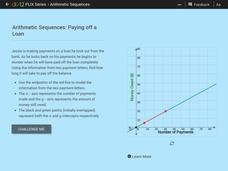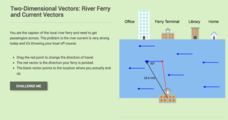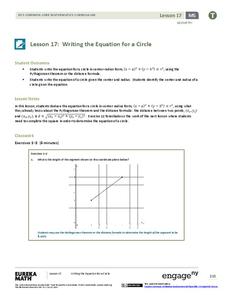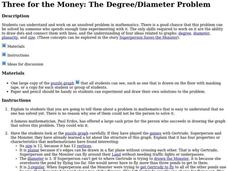Curated OER
"Zero-ing" In On Integers
Learners add and subtract integers. In this integer lesson, students use models to demonstrte the addition and subtraction of integers. They describe zero pairs and write steps to add and subtract integers.
Curated OER
Masses of Atoms
In this masses of atoms activity, high schoolers complete a chart of 7 isotopes with their isotope symbol, atomic mass, atomic number, and the number of protons, neutrons and electrons. They calculate the average atomic mass of two...
Curated OER
Asymptotes And Zeros of Rational Functions
Budding mathematicians graph polynomial functions and examine their zero and y-intercepts. They analyze how the zero and y-intercepts of the numerator and denominator affect the graph of a rational function. Several great additional...
Curated OER
A Human Number Line
Eighth graders act out a number line using integers -10 to 10 on large cards. They practice addition and subtraction of these integers to gain explain the relative size of numbers.
Teach Engineering
Club Function
Let's get the herd to follow the rules. The activity associated with the second lesson in the unit introduces the class to the definition of a function. Individuals must gather in groups of zebras and rhinos defined by the general...
Novelinks
The House of the Scorpion: Concept Analysis
Considering using Nancy Taylor's award-winning science fiction novel The House of the Scorpion as an option for book circles or as a whole-class reading? Check out this packet that includes background information, information about the...
CK-12 Foundation
Integers: Tiling a Chessboard with Dominoes
Ten questions make up an interactive all about integers. Scholars answer multiple choice, short answer, and discussion questions using a 4x4 chessboard and dominoes.
CK-12 Foundation
Decimals as Fractions
Converting decimals to fractions is the focus of a five-question interactive. A color-coded tool assists mathematicians in discovering solutions. Multiple-choice questions make up the majority of the problems and a discussion question...
CK-12 Foundation
Single Variable Division Equations: Paper Car Tires
Don't tire of solving equations, mix up your lesson! A virtual interactive has users drag paper tires to toy cars. Solving a one-step equation lets them find how many cars can be made from a given number of tires.
CK-12 Foundation
Frequency Tables to Organize and Display Data: Favorite Films
What information can your class determine if they know the number of people attending movie showings? Using the information about the number of people at each screening, learners develop a frequency table. The pupils analyze the type of...
CK-12 Foundation
Sequence: The Sequence Calculator
Work through a sequence in discovering number patterns. Using the interactive, pupils explore arithmetic and geometric sequences by setting the initial value and the common difference or ratio. Learners distinguish between the two types...
West Contra Costa Unified School District
Adding Numbers
Support math instruction at home with a helpful reference sheet designed for parents. Three pages cover the subject of addition with written details and labeled pictures.
CK-12 Foundation
Inequalities that Describe Patterns: Freezing Cold Comparison
Don't freeze out the interactive on inequalities from your lesson plans. Young mathematicians use an interactive thermometer and number line to compare freezing temperatures. Inequalities help express these comparisons.
CK-12 Foundation
Arithmetic Sequences: Paying of a Loan
How long does it take to pay off a loan? Pupils use a graph to model the sequence associated with paying off a loan. Using the graph, learners determine the initial value and the common difference of the arithmetic sequence. The learners...
CK-12 Foundation
Two-Dimensional Vectors: River Ferry and Current Vectors
Fight against the current. Pupils explore the resulting path when they are crossing a river while being pushed downstream by the current. Using vector notation, learners express the speed and direction of a ferry. They finish by...
CK-12 Foundation
Recursive Formulas: Fibonacci Sequence
Explore the building blocks of the Fibonacci Sequence. Given the lengths of sides of squares, pupils deduce the pattern to determine the lengths of two more squares. Learners continue to work with recursive formulas to generate numerical...
CK-12 Foundation
Limit of a Sequence: Finding the Limit of a Sequence (Part 4)
Take a look at another alternating sequence. The resource provides a graphical display of a sequence that alternates between two values. Pupils use the display to determine whether the sequence has a limit. Given a theory of limit,...
Early Childhood Learning and Knowlege Center
My Body My Senses
In a comprehensive unit of activities, learners explore the five senses. Youngsters discover the many different body parts and their functions that allow humans to have sense of sight, touch, smell, taste, and hearing. The best way to...
EngageNY
Writing the Equation for a Circle
Circles aren't functions, so how is it possible to write the equation for a circle? Pupils first develop the equation of a circle through application of the Pythagorean Theorem. The lesson plan then provides an exercise set for learners...
Curated OER
Guess-timating Fun
Learners estimate the number of items in a jar and write their estimate boldly on a piece of paper. They line up holding their numbers. Then, they calculate the median, mean, mode and average of the guesses.
US Department of Commerce
Apportionment: Grades 3-4
Apportionment is a big word for young pupils. Use a helpful cartoon video and worksheet with data set to help them understand how the census fuels representative democracy. After examining how the census determines the number of seats a...
Curated OER
Geometry Concepts and Applications
For this concepts and applications review worksheet, 10th graders solve and complete 40 various types of multiple choice problems. First, they write the equation of a vertical line passing through a point. Then, students find the...
Curated OER
Density Phenomena-Using the Concept of Density
Students investigate the concept of density by observing demonstrations. In this density lesson plan, students make observations while the teacher demonstrates the Cartesian diver, a density column, a candle trough, a wave bottle, an...
Curated OER
Three for the Money: The Degree/Diameter Problem
Students explore the degree, diameter, planarity, and size of graphs. For this degree, diameter, planarity, and size of graphs lesson, students try to construct a graph with more than 12 vertices that satisfy all other...


